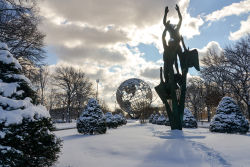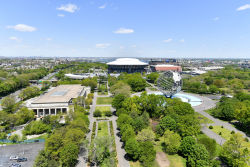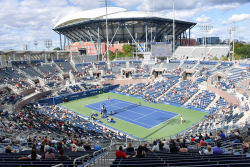Flushing Meadows Corona Park
The Asian Longhorned Beetle - Flushing Meadows-Corona Park
The Asian longhorned beetle (Anoplophora glabripennis) was found in Greenpoint, Brooklyn in 1996. Scientists believe it came to the United States by way of wood crating and shipping pallets that originated in China. In Asia, the beetle is a major pest of poplar plantations. The beetle also attacks a large range of tree species in North America, including maple, elm, willow, horsechestnut, mulberry, birch, green ash, sycamore, and London planetree. Like chestnut blight and Dutch elm disease, the Asian longhorned beetle has the potential to severely deplete our precious urban forests and permanently change our hardwood forests.
The Chinese name for the Asian longhorned beetle translates to “Starry Sky beetle,” a description of the beetle’s shiny black body and white spots. The beetles are large, up to one and a half inches in length, with long black-and-white banded antennae. The threat to trees begins when adult females lay eggs under the bark of host trees. After the eggs hatch, the larvae bore extensive tunnels into the tree’s center as they feed and grow. In the spring, the larvae emerge as adult beetles, creating round exit holes that measure up to half an inch in diameter. The newly emerged adults feed and mate. The adult females may fly to new trees or lay eggs in the trees from which they emerged. Then the life cycle of the Asian longhorned beetle begins again, and the relentless tunneling by generations of larvae kills healthy trees within a few years of first becoming infested.
In addition to Greenpoint, Brooklyn, the Asian longhorned beetle has also been found in Bayside, Queens (February 1999), Flushing, Queens (July 1999), the Upper East Side of Manhattan (August 1999), the Lower East Side of Manhattan (June 2000), Corona, Queens (July 2000), and Murray Hill in Manhattan (October 2001). Outside of New York City, the Asian longhorned beetle has been found infesting urban trees in Amityville, New York; Chicago, Illinois (July 1998), and Braunau, Austria (July 2001).
Since the discovery of the beetle in 1996, Parks, the New York State Department of Agriculture and Markets (NYSDAM), and the United States Department of Agriculture (USDA) have been engaged in an ongoing effort to eradicate the beetle from the United States. Surveys of public and private trees to identify trees infested by the Asian longhorned beetle are ongoing. Once found, infested trees are removed and chipped entirely to prevent the spread of the beetle. As of November 2001, over 3,400 infested trees have been removed from public and private property in New York City.
In addition to destroying infested trees, federal and state quarantines prevent the movement of wood from infested areas in the United States. The purpose of the quarantines are to prevent the accidental spread of the beetle to new areas through the movement of infested wood. In April 2000, the USDA injected trees susceptible to the Asian longhorned beetles in New York City with a systemic insecticide. This treatment may reduce the trees’ chances of becoming infested and slow the spread of the beetle.
While city, state and federal agencies continue their efforts fighting the Asian longhorned beetle where it has already been found, it is important to remember that many of the new infestations were reported by concerned citizens. We ask you to join us in this battle to save trees and to eradicate the Asian longhorned beetle. If you see this beetle or signs of beetle damage call New York City Parks & Recreation at 1-800-201-PARK or the United States Department of Agriculture at 1-866-265-0301. Please note the date and location where you found the beetle or damaged tree. With your help, we can save our city’s trees and forests and prevent this tree-killing pest from spreading nationwide.
Check out your park's Vital Signs
Clean & Safe
Green & Resilient
Empowered & Engaged Users
Share your feedback or learn more about how this park is part of a
Vital Park System

Know Before You Go

Downloads
- New York State Pavilion Listening Session
- Strategic Framework Plan: Introduction
- Strategic Framework Plan: Site Analysis
- Strategic Framework Plan: Conceptual Framework, Part I
- Strategic Framework Plan: Conceptual Framework, Part II
- Strategic Framework Plan: Vision and Goals, Part I
- Strategic Framework Plan: Vision and Goals, Part II
- Strategic Framework Plan: Appendix, Part I
- Strategic Framework Plan: Appendix, Part II
Links
- National Tennis Center Strategic Vision Project
- World Ice Arena
- Citi Field
- Mets Ticketing
- USTA National Tennis Center
- US Open
- Terrace on the Park Catering Hall
- New York Hall of Science
- Queens Museum
- Queens Botanical Garden
- Queens Theatre
- Queens Wildlife Conservation Center
- Fantasy Forest at the Flushing Meadows Carousel
- Wheel Fun Rentals
- Alliance for Flushing Meadows Corona Park
Contacts
General Park Info: (718) 760-6565
Pitch N Putt Golf and Miniature Golf : (718) 271-8182
World's Fair Marina on Flushing Bay : (718) 478-0480
World's Fair Marina Restaurant: (718) 898-1200
Terrace on the Park: (718) 592-5000
Citi Field: (718) 699-4220
Mets Ticketing: (718) 507-TIXX
USTA National Tennis Center: (718) 760-6200
US Open/USTA: (914) 696-7000
New York Hall of Science: (718) 699-0005
Queens Museum: (718) 592-9700
Queens Botanical Garden: (718) 886-3800
Queens Theatre: (718) 760-0064
Queens Wildlife Conservation Center: (718) 271-1500
Sports Permits: (718) 393-7272
Picnic/Barbeque Permit for Large Groups: (718) 393-7272
Wheel Fun Rentals: (917) 231-5519
World Ice Arena: (718) 760-9001
Al Oerter Recreation Center: (718) 353-7853
Flushing Meadows Corona Park Pool & Rink: (718) 271-7572
Special Events Permits: (718) 760-6560
Tennis Permits: (718) 393-7276
Volunteer Coordinator: (718) 760-6561










